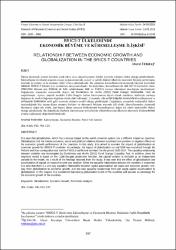BRICS-T ülkelerinde ekonomik büyüme ve küreselleşme ilişkisi
Citation
TEKBAŞ, M . (2019). BRICS-T ÜLKELERİNDE EKONOMİK BÜYÜME VE KÜRESELLEŞME İLİŞKİSİ*. Finans Ekonomi ve Sosyal Araştırmalar Dergisi (FESA) , 4 (3) , 397-412 . DOI: 10.29106/fesa.615249Abstract
Dünya ekonomik sistemi üzerinde ciddi etkisi olan küreselleşmenin ülkeler üzerinde etkisinin farklı olduğu görülmektedir. Küreselleşme ile ülkeler arasında oluşan yoğun ekonomik, sosyal ve politik ilişkiler ülkelerin ekonomik büyüme performansı üzerinde de olumlu ya da olumsuz etkiler ortaya çıkarmaktadır. Bu çalışmada küreselleşmenin ekonomik büyüme üzerindeki etkisinin BRICS-T ülkeleri için incelenmesi amaçlanmaktadır. Bu doğrultuda, küreselleşmenin reel GSYH üzerindeki etkisi, 1990-2014 dönemi için Pedroni ve Kao eşbütünleşme testi ve FMOLS katsayı tahmincisi aracılığıyla incelenmiştir. Değişkenler arasındaki nedensellik ilişkisi ise Dumitrescu ve Hurlin (2012) Panel Granger Nedensellik Testi ile araştırılmıştır. Ayrıca, ampirik modelin Cobb-Douglas üretim fonksiyonuna dayalı olarak kurulması nedeniyle sermaye değişkeni de modele bağımsız değişken olarak dahil edilmiştir. Çalışmada elde edilen bulgular sonucunda küreselleşmenin ve sermayenin birikiminin milli gelir üzerinde etkisinin pozitif olduğu görülmüştür. Değişkenler arasındaki nedensellik ilişkisi incelendiğinde kişi başına düşen sermaye birikimi ve ekonomik büyüme arasında çift yönlü, küreselleşmeden ekonomik büyümeye doğru tek yönlü, kişi başına düşen sermaye birikiminden küreselleşmeye doğru tek yönlü nedensellik ilişkisi olduğu görülmüştür. Bu doğrultuda ülkelerin küreselleşme seviyelerinin yükseltilmesinin ülkelerin ekonomik büyümelerinde avantaj sağlayacağı değerlendirilmektedir. It is seen that globalization, which has a serious impact on the world economic system, has a different impact on countries. Globalization and the intense economic, social and political relations between countries have positive or negative effects on the economic growth performance of the countries. In this study, it is aimed to examine the impact of globalization on economic growth for BRICS-T countries. Accordingly, the impact of globalization on real GDP was examined through the Pedroni and Kao cointegration test and the FMOLS coefficient estimator for the period 1990-2014. The causality relationship between variables was investigated by Dumitrescu and Hurlin (2012) Panel Granger Causality Test. In addition, since the empirical model is based on the Cobb-Douglas production function, the capital variable is included as an independent variable in the model. As a result of the findings obtained from the study, it was seen that the effect of globalization and accumulation of capital on national income was positive. When the causality relationship between the variables is examined, it is seen that there is a one-way causality relationship between capital accumulation per capita and economic growth, oneway from globalization to economic growth, and one-way causality relationship from per capita capital accumulation to globalization. In this respect, it is considered that raising globalization levels of the countries will provide an advantage for the economic growth of the countries.
Source
Finans Ekonomi ve Sosyal Araştırmalar Dergisi (FESA)Volume
4Issue
3Collections
- Makaleler [6]



















